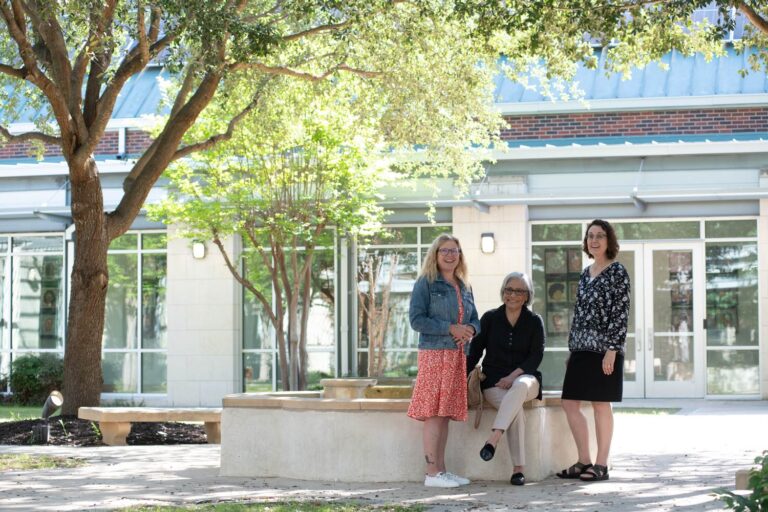Professor Fernando Segovia, Oberlin Graduate Professor of New Testament and Early Christianity at the Vanderbilt University Divinity School, reflected on international ferment over Latin American liberation theology 50 years in the 2018 Escobedo Lecture ago October 11 at Oblate School of Theology.
The Escobedo Lecture was established in 2017 by a gift to the School by Ruben M. Escobedo and Veronica Salazar Escobedo, Honorary Oblates of Mary Immaculate, to provide an annual lecture in Spanish at the School in perpetuity.
Dr. Segovia highlighted the many academic works produced from 1967-72 on the problem of colonialism and the Bible, while noting that myriad academic works on the movement were finished both before and after that period. Those works, and the liberation theology movement itself, have had deep and wide impact throughout Latin America and the Global South, and have caused repercussions even in the Global North, he said. .
Reflections on colonialism and the Bible were profoundly inspired decolonization, which had begun two decades before 1967, Dr. Segovia explained. He said the movement quickly spread to Africa and the Middle East as well as Asia and the Pacific, adding, “This certainly can be described as one of the most important developments in Christian affairs and Christian studies of the 20th century.”
The Second Vatican Council influenced a 1967 document written by Third World bishops on poverty in the developing world and the exploitation of these nations and their peoples by developed nations. The 1968 Latin American Bishops’ Conference meeting in Medellín, Colombia, produced the first formal articulation of “the preferential option for the poor” as a fundamental principle of the Catholic Church in Latin America.
Dr. Segovia also cited the publication of A Theology of Human Hope by Ruben Alves in 1969, Teología de la liberación by Hugo Assman in 1970 and Teología de le liberación: una evaluación prospectiva by Gustavo Gutierrez in 1971. The latter became the classic statement of the liberation movement, he said.
In 1972, Christians for Socialism met in Santiago, Chile, aiming to liberate Latin America by applying socialist principles and structures; the Pontificia Universidad Comillas in Madrid, Spain, organized a conference on Christian faith and social change in an effort to introduce liberation to Europe; and Leonardo Boff published Jesu Cristo Libertador: Ensaio de cristología critica para o nostro tempo, emphasizing the political dimensions of christology from a Latin American perspective. These also were seminal in the liberation movement.
At the heart of the project of liberation, Dr. Segovia explained, is the conviction that all religious-theological movements are contextual in nature – “formed, formulated and pursued in particular material and discursive contexts. That context for liberation was the social and cultural reality of Latin America in the 1960s and 1970s.” It was a reality marked by massive poverty and injustice, affecting life in the region at the social, individual and religious levels.
“Liberation saw its fundamental task as addressing the context of poverty and injustice while committing itself to the cause of the poor and oppressed,” he said. It looked at dimensions of and reasons for poverty and oppression, made a critical analysis of views on poverty and oppression in the Christian tradition (in biblical texts and ecclesial traditions) and critically analyzed strategies needed for transformation beyond poverty and oppression.
Dr. Segovia also shared more recent reflections on the liberation project. In Colonialism and the Bible: Contemporary Reflections from the Global South, a book published this year and of which he was co-editor, scholars from throughout the Global South addressed the problem of colonialism and the text of the Bible. Three contributing authors – Nancy Bedford, Vitor Westhelle and Ivan Petronella responded with explicit reference to the liberation movement and addressed the question of its current viability.
He said that Bedford wrote of how the Bible has been used for destructive as well as constructive purposes, owing to the complex and ambiguous character of the Bible and interpretations of it. In Latin America, the Bible “has been and still can be used for death or life, for oppression or liberation,” Dr. Segovia observed. He said that Bedford aimed to advance a liberatory reading in Latin America.
Petrella addressed the fate of the Bible in the liberation theology movement in Latin America, distinguishing between traditional use of the Bible and its present need for an alternative model.
He cited a continuing critique of the traditional model from within the liberation movement itself, “a fundamental change in global affairs that affects the social-cultural context of liberation from without, as signified by attack on the World Trade Center and the collapse of the Argentinian economy,” both in 2001. They involved religion and use of the Bible as a sacred text, and brought to a climax the internal critique regarding the liberation movement’s appeal to the Bible, Dr. Segovia said. Petrella espoused this critique and sought to move it forward.
The professor said that Westhelle aimed to affirm and enhance the emerging reception of the Bible in Latin American under the aegis of liberation theology, a way of reading that spread to other “political and religious movements in the Third World” and still is employed today. “Such a reading is not deemed to be in need of correction or alteration; to the contrary, it is praised and appropriated,” he observed. “However, such a reading is seen as lacking critical grounding; consequently, a thorough methodological and theoretical foundation is advanced.”
The professor explained that these perspectives and the author’s proposals “provide an excellent spectrum of possible paths for the future, within which all of us – Latin Americans and Caribbeans at home or in the diaspora – can situate ourselves as we, too, must weigh the significance of the project in our times.”
In dealing with the problem of colonialism and Scripture, he explained that these critics affirmed the long shadow cast by the colonial enterprise and the pivotal role biblical texts played throughout. “The project is in no way a relic of a past long surpassed, but rather a continuing force with nefarious consequences for peoples and nations,” he said.
However, Dr. Segovia continued, “the Bible is seen as playing a driving role in the project. It is in no way an innocent observer, but rather an active agent in its implementation as well as a ready source for its dystopian ramifications in society and culture.”
Bedford observed that the Bible has been and continues to be use toward destructive ends throughout both colonialism and neocolonialism. Such use, Dr. Segovia said, is characterized as a reading for oppression and unto death. “The reason, she states…lies in the nature of the Bible as a conflicted text, where death and oppression are very much present. These forces of dystopia are not unpacked at all, either in the text or in reality. What is pursued is a utopian impulse: opting for a constructive reading unto life and liberation. This path is provided by a renewed commitment to a hermeneutics of liberation,” the professor explained.
He said Petrella highlighted the structural and justifiable violence found in the texts; Westhelle remained silent on this point, but all three argue for a renewed recommitment to liberation. But he said the central question is what such renewed commitment entails.
Westhelle called for revision by way of more secure grounding in terms of method and theory. The result, Dr. Segovia asserted, “will allow liberation to read ever more sharply and effectively the social-cultural realities at work in the world of Western hegemony, emerging thereby as a form of postcolonial reading.”
Petrella called for revision by way of major adjustments through the lens of biblical tradition. This involves awareness and critique of both the violence espoused and the monolithic concept of idolatry present in the text, over against either an innocent appropriation or a simplistic appropriation of the Bible, Dr. Segovia explained.
“Toward this end, (Petrella) argues for a multireligious and multicultural perspective, having a variety of sacred writings in view and a variety of idolatries in mind. The result, a savvy and nuanced approach, will allow liberation to address the social-cultural realities at work in the post-2011 world marked by the logic of fundamentalism and the logic of modernity,” Dr. Segovia observed.
Bedford, he observed, occupies a middle ground between the other two critics, calling for a revision by way of the Spirit, arguing for a pneumatic reading that exercises freedom over both text and reality. For such orientation, Dr. Segovia said, Bedford draws on Latin American indigenous traditions and poetic reasoning.
Concluding, he explained, “The result, a multivalent subversive reading, will allow liberation to advance the message of Jesus of life for all, especially the most deprived in the world of neocoloniality. Across the spectrum, therefore, what the revised resumption of liberation does is provide a hope of utopia in the midst of dystopia.”



